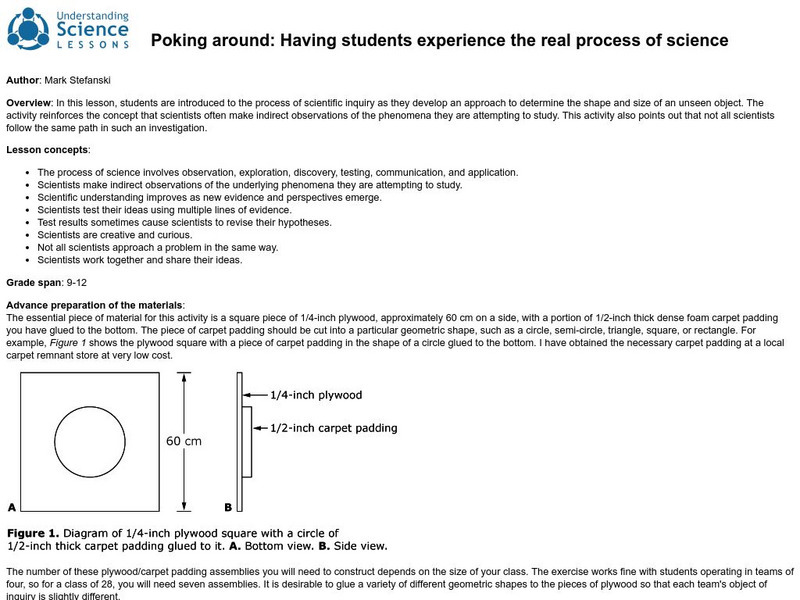Other
Science4 Us: Science Tools
The Tools module introduces students to the tools scientists use for both qualitative and quantitative observations. Students learn to use tools such as their senses, rulers, and balance scales through hands-on activities.
PBS
Pbs Learning Media: Observing Refraction of Light
This video segment adapted from Shedding Light on Science illustrates how light changes speed, and thus direction, in a process known as refraction. Includes background reading and discussion questions. [2:05]
University of California
University of California at Berkeley: Understanding Science: Poking Around
Students work in groups to develop an understanding of the size and shape of an object hidden beneath a plywood board, asking questions, testing their reasoning, and drawing conclusions, as scientists do. Students are never permitted to...
Other
Science4 Us: Observing Matter
Students begin to learn the words to describe matter correctly and accurately, learning important skills for communicating scientific information. They will also observe using their senses and scientific tools to measure numerical...
Smithsonian Institution
Smithsonian Education: Minerals, Crystals, and Gems
Through this series of three lessons, students will gain an understanding of the basics of mineral science. In their investigation they will also work through the scientific process as they practice their observation skills, form...
American Geosciences Institute
American Geosciences Institute: Earth Science Week: Exploring Color Maps
An activity where students study the Ozone Hole poster used that brings together colorful images of over 30 years of satellite observations of the ozone hole. Students interpret the color on the globes to see how the ozone hole has...
AdLit
Ad lit.org: Using Technology to Support Struggling Students
Science learning often involves creating abstract representations and models of processes that we are unable to observe with the naked eye. Learn more about visualizing, representing, and modeling to aid struggling learners.
University of Missouri
Microbes in Action: "There's Something Fishy": The Nitrogen Cycle
An opportunity for students to experience the nitrogen cycle through observing daily changes in an aquarium. Students test the level of three nitrogen compounds to understand the process of nitrification. Lesson plan gives a lab...
Other
Compound Interest: A Rough Guide to Types of Scientific Evidence
This infographic takes a look at science in general, specifically focusing on the hierarchy of different types of scientific evidence.




